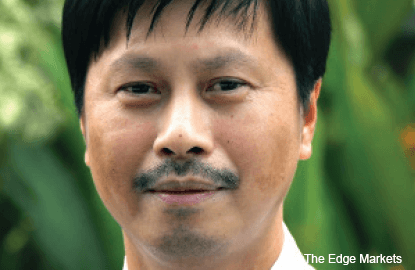
This article first appeared in The Edge Malaysia Weekly, on Nov 23 – Nov 29, 2015.

The present low oil price environment and stronger US dollar are tailwinds that have boosted the earnings growth of Johor-based precision plastic injection mould manufacturer LCTH Corp Bhd.
Thus, the sharp rise in its share price in the past eight months or so is understandable. Year to date, the counter has risen more than 200%. It settled at 78 sen last Thursday, giving it a market capitalisation of RM280.8 million.
That the company has drawn keen investing interest has not gone unnoticed by managing director Elson Hew Lien Lee.
“If we continue to do well, naturally our share price will go up. Nowadays, investors are paying more attention to us. When we make profits and pay dividends, our shareholders will have more confidence in the company,” he tells The Edge.
Despite a 7.6% decline in revenue to RM87.9 million in the nine months ended Sept 30 (9MFY2015), LCTH saw its net profit more than double to RM15.5 million from RM6.9 million the year before. The stronger earnings performance was attributed to better operational efficiency, foreign exchange (forex) gains and its focus on higher margin projects.
In the financial year ended Dec 31, 2014 (FY2014), the company saw its net profit fall 18% year on year to RM12.9 million. However, its higher net profit of RM15.8 million in FY2013 was partly due to a one-off gain from the disposal of property, plant and equipment.
Currently, LCTH (fundamental: 2.10; valuation: 1.40) operates two manufacturing plants — one in Senai, Johor, and the other in Prai, Penang. While its plant in Senai is running at an average utilisation rate of 60%, its Prai plant is operating at almost peak capacity at 80%.
To expand its production capacity in Penang, the company intends to purchase a 10-acre parcel in the areas of Butterworth and Batu Kawan. However, it has encountered a hiccup as the state government is only willing to allocate a parcel measuring up to five acres.
Nevertheless, LCTH can still count its blessings as the drop in oil prices globally has made the cost of doing business cheaper, while the strong US dollar has contributed to its forex gains.
“The stronger US dollar will certainly help enhance our financial performance. Our sales revenue is in US dollars while our labour and transport costs are in ringgit, so there will be a lot of savings and forex gains there,” says Hew.
In FY2014, about 58% of LCTH’s sales and 51% of its costs were denominated in foreign currencies, primarily US dollars, Singapore dollars and the euro. For 9MFY2015, the group reported a net profit of RM15.5 million, RM5 million of which was forex gains.
Hew, who took the helm as the company’s managing director in 2004, expects the greenback to remain strong and stay above 4.00.
“I think the forex trend will continue to be favourable to us, unless the oil price jumps sharply … then maybe it will help the ringgit,” he comments.
Realistically, however, global oil prices are expected to remain soft as the Organization of the Petroleum Exporting Countries has no plans to cut production while the US, the world’s largest oil consuming country, maintains a high level of inventory, says Hew.
Export-oriented plastic product manufacturers, including LCTH, are among the beneficiaries of the current weak crude oil prices, which result in lower resin prices and hence ease their cost pressure.
LCTH is 70.6%-owned by Singapore-listed Fu Yu Corp Ltd, one of the largest suppliers of high-precision injection moulds and plastic injection moulded parts in Asia.
LCTH has two wholly-owned subsidiaries — Penang-based Fu Hao Manufacturing (M) Sdn Bhd and Johor-based Classic Advantage Sdn Bhd, both of which are engaged in the manufacturing and sub-assembly of precision plastic parts and components, as well as fabrication of precision moulds and dies.
Hew, 58, has more than 30 years of experience in the plastic injection moulding industry. In 1993, he was appointed a director of Classic Advantage and Fu Hao Manufacturing. The companies become subsidiaries of LCTH in 2004.
He says both Fu Hao Manufacturing and Classic Advantage have a strong customer base, which consists mainly of multinational corporations.
Save by subscribing to us for your print and/or digital copy.
P/S: The Edge is also available on Apple's AppStore and Androids' Google Play.